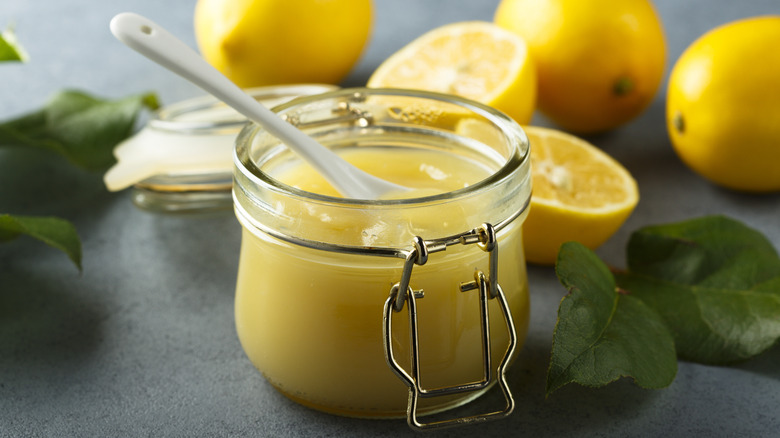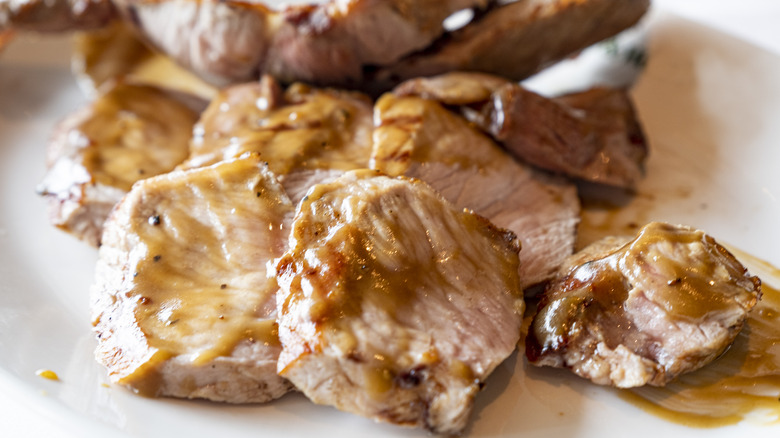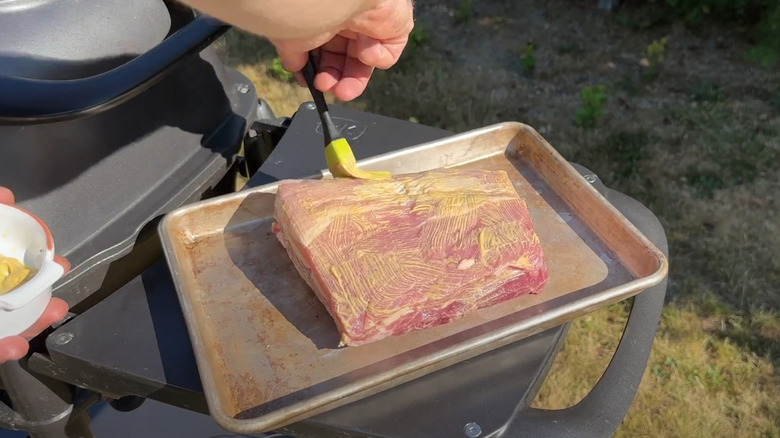Your Jar Of Lemon Curd Is Your Secret Weapon For More Flavorful Meat
Most people only ever see lemon curd in fillings for pies, meringues bites, or cake toppings, so if you balk at the idea of using it as a glaze for your meat ... we don't blame you. It's definitely an unconventional choice, but trust us when we say that this sweet and tart spread is a game-changer.
For the uninitiated, think of lemon curd as custard's citrusy cousin. The two actually share a lot of ingredients, like egg yolks, sugar, and butter; lemon curd recipes just get an extra splash of lemon juice for flavoring. Aside from giving the lemon curd a nice, creamy look, the sugar, fat, and bright acidity all make this spread a great candidate for a meat glaze. Sugar can help caramelize the outer skin of whatever protein you pick — whether that's chicken, fish, or something else entirely — and both the fat and the lemon juice have a hand in keeping everything juicy and flavorful. So, just by using this pretty simple glaze, you can easily turn a routine dinner into gourmet fare.
What kind of lemon curd is great for glazing?
As is the case with almost any dish, homemade is hard to beat. It's alright to use store-bought lemon curd, but considering that it's mass-produced, it likely won't taste as good (and yes, this is a hint that you should seriously consider making your own lemon curd — it's simpler than you might think!). Do note, however, that you should avoid sugar-free lemon curd if you want this trick to work. Remember, one of the biggest benefits of using it as a glaze is that the sugar can help caramelize the meat. Without that sugar, the meat won't caramelize properly.
Most of the lemon curd you'll find at grocery stores will be sweetened with white sugar. If this is a concern for you, then that's one more reason why you should make your own version. Try swapping out white sugar for honey — this golden liquid is super saturated with sugar, so it can aid the caramelization process just fine. Other than totally side-stepping granulated sugar, can you really say no to the glaze's touch of complex, honeyed sweetness?
Making a lemon curd glaze is easier than you think
For your first time testing this trick, try seasoning your lemon curd with Dijon mustard for a sharp kick and adding minced garlic and Worcestershire sauce. Give it a taste and adjust with salt if necessary — that's your meat glaze done! This lemon curd glaze is super versatile, though. You can even try adding chili for a touch of heat (cayenne and paprika are both fine). If you like what you taste once you've given it a shot, feel free to experiment with other spices to see what suits your palate.
Once you have your glaze in hand, start cooking the meat and wait until it's just about finished. Then, take a brush and cover the exterior with a good amount of the glaze (you don't want to put the glaze on too early since the sugar could burn and turn the meat bitter). As the glaze caramelizes, the golden-colored coating will start to darken. Be on your toes for this part in case it starts to burn. If the glaze still looks beautifully golden when the meat finishes cooking, then you have a tasty meal coming your way.
Besides white meat like chicken, you can use the glaze for red meat (like ribs or tenderloin), seafood, and various veggies. Your imagination and appetite really are the only limits to what you can do with this ingredient — who said lemon curd is only for baking?


